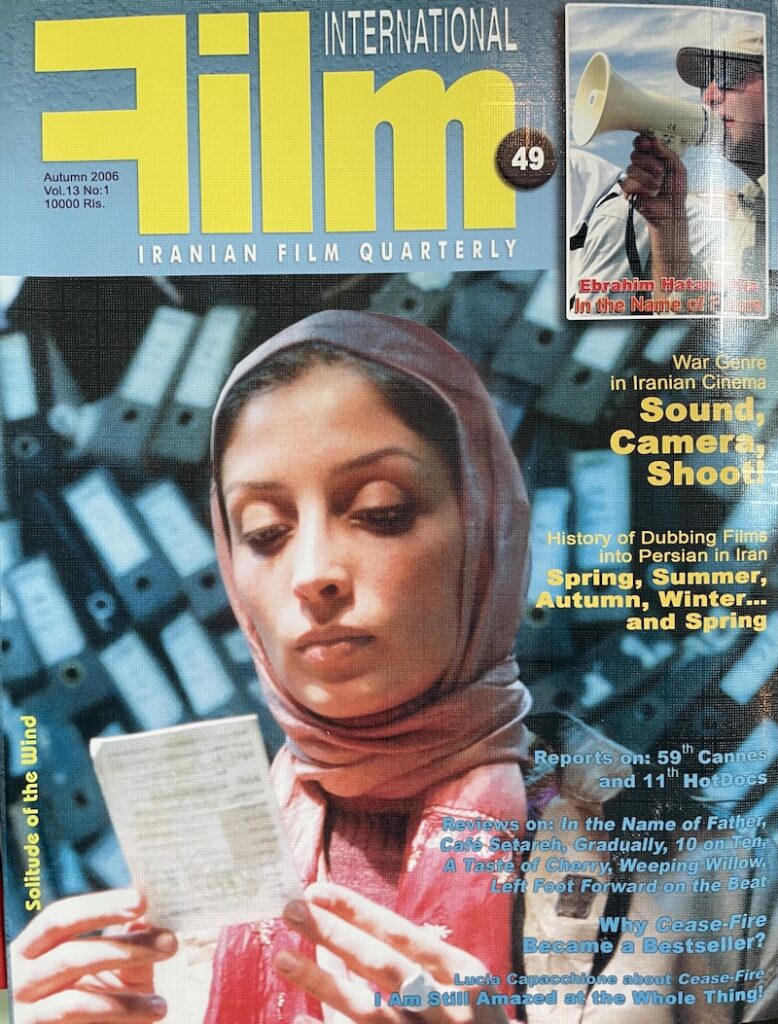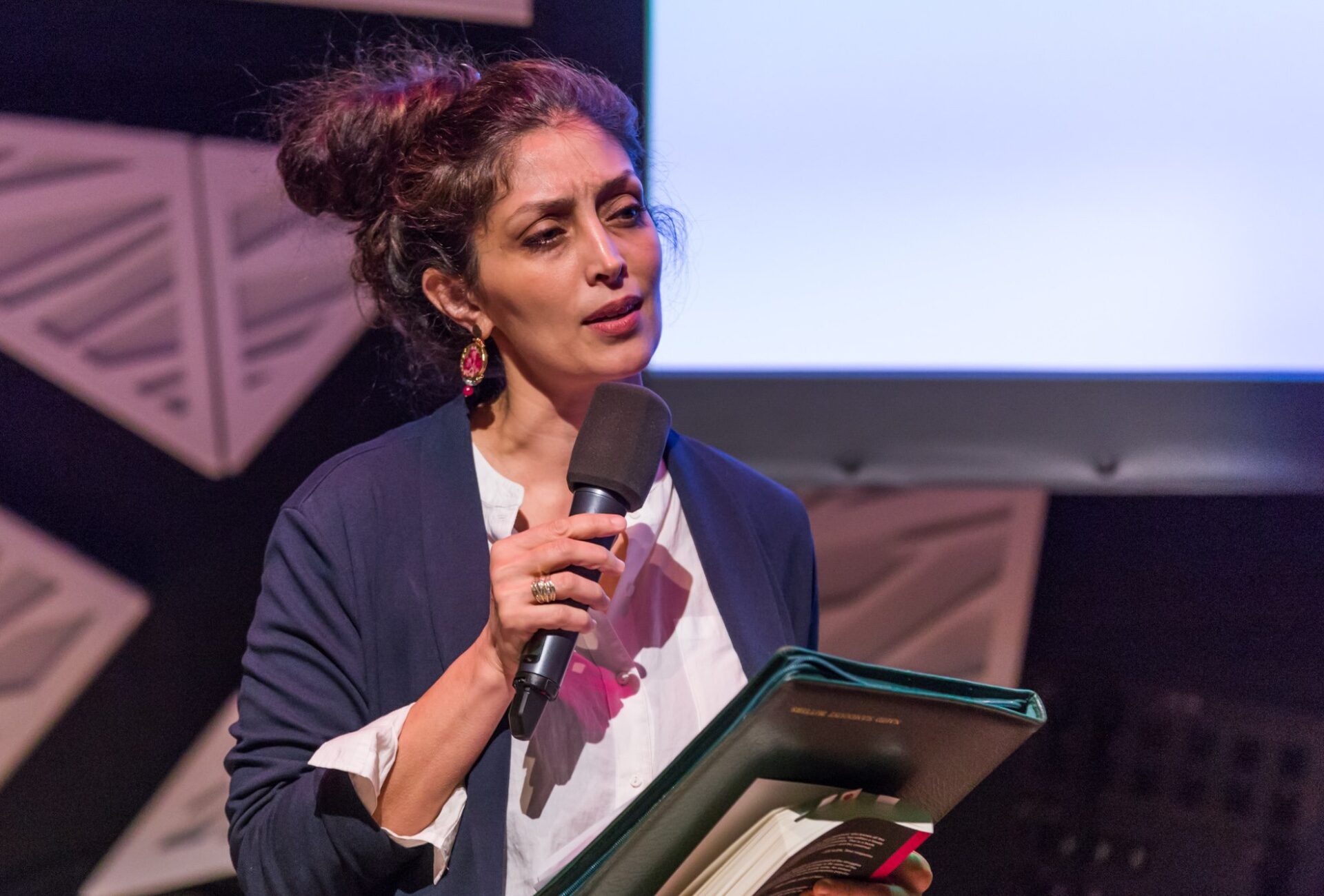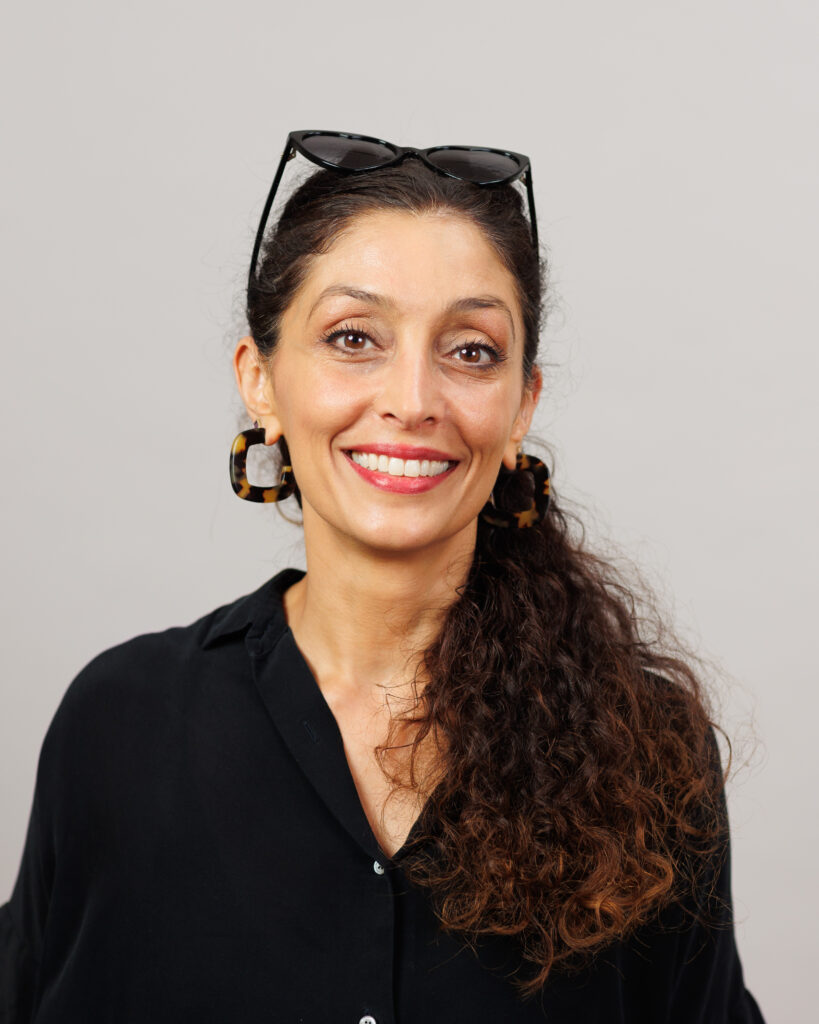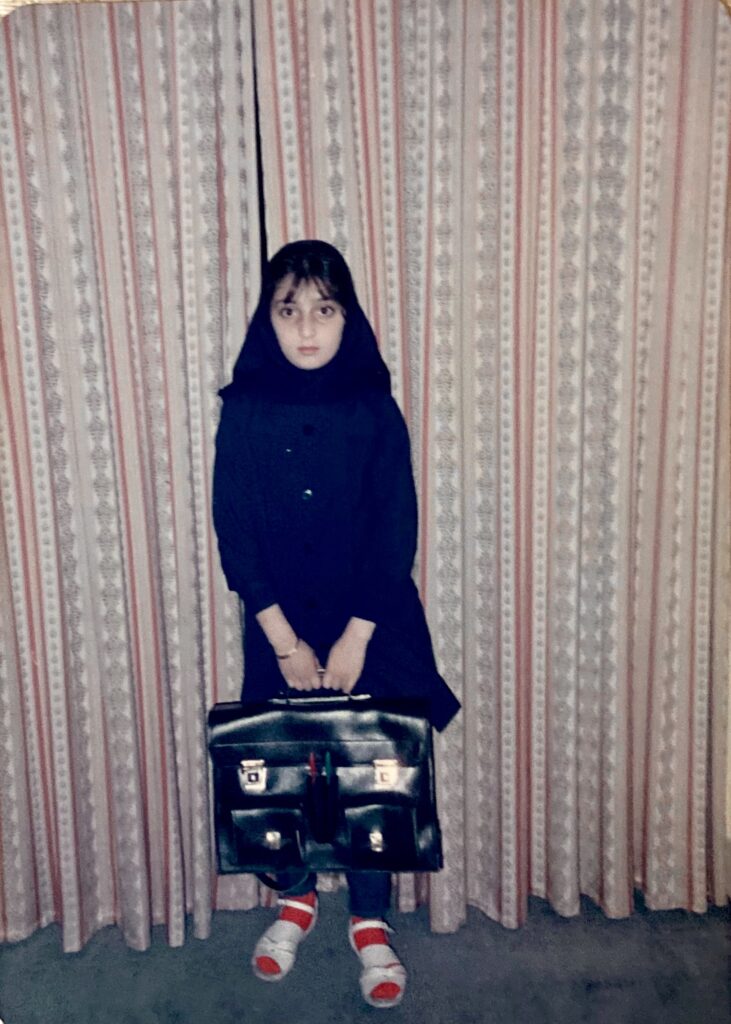Nahid Siamdoust left Iran with her family toward the end of the Iran-Iraq War, after an Iraqi bomb hit her elementary school, killing a number of students. In the decades since, she has lived a truly global life, coming of age in Germany, attending college and graduate school in the U.S., working as a journalist in Iran and Qatar, and then earning her Ph.D. in the U.K. She is now an assistant professor of Middle Eastern Studies at UT Austin and the author of Soundtrack of the Revolution: The Politics of Music in Iran (Stanford, 2017). I spoke to Siamdoust recently about her background, her work as a reporter, her scholarship, and her thoughts on the ongoing fight for democracy in Iran.
Let’s start at the beginning. What’s your origin story?
I was born in Iran and lived there until I was ten. We left Iran because of the Iran-Iraq War, and I grew up in Germany, going to high school there and then coming to the U.S. for college, doing my undergraduate work at Barnard College in New York, and then getting a master’s degree in international affairs at Columbia University. Then 9/11 happened. I decided to pack my bags and go to Iran and work as a journalist there. Not long after I got there, I was hired as the Iran correspondent for Time magazine. I reported on Iran for four years and then took up a position as a correspondent and presenter for Al Jazeera English, in Doha, Qatar.
I worked for them for a couple of years and increasingly began to feel like it wasn’t enough. There just wasn’t room for enough depth and nuance, especially in television, where the stories are usually 2 to 3 minutes long. So I started doing a Ph.D. at the University of Oxford in modern middle eastern studies, continuing my journalism while I worked on that. After I finished, I committed to the academic track, though I still write journalistically once in a while.
I have so many questions, but first, how did you end up in Germany? My vague sense is that there are diasporic Iranians all over the world, and very different stories about how they ended up in the various places.
The Iranian diaspora is very big at this point, and Germany is one of the main sites. One reason is that prior to the revolution, a lot of Iranians went to Germany for their university degrees. But pre-revolutionary Iran was a relatively good place to live for people with an education, so they wouldn’t stay in Germany after they graduated. They would go back to Iran, establish families, and continue living there. My father had gone to university in Lubeck, in the north of Germany, and while there he had started a Persian rug business. He had gone back to Iran, but he kept the business going, and had business partners who lived in Würzburg, Bavaria, and that’s where we first ended up before ultimately settling in Hamburg.
Even during the war—even after the revolution turned out much worse than people like my parents had feared it would—we stayed in Iran for a while. We had large families there. My parents remained hopeful that things would get better. We finally left after a bomb hit my elementary school. There was a girls’ side and a boys’ side of the school, and a bomb hit the boys’ side at the time when school was letting out. Some of the students were killed in that attack, and that’s what really pushed my parents to leave.
It was the last year or so of the war, and Saddam Hussein’s planes were dropping bombs on the city. I remember we’d sometimes go to the rooftops, because my father was crazy, and he would point to the planes flying overhead and say, ‘Those are the planes that are dropping bombs on us.’
Was it difficult to get out?
Because of my father’s business it wasn’t. We were able to get visas. For a lot of other Iranians who emigrated to Germany as asylum-seekers it was much harder. We were lucky.
I’m always fascinated, and kind of jealous, when I hear stories of people who decided they were going to be foreign correspondents and just upped and went somewhere far away, without a job or anything secure. It’s so gutsy. Was it that straightforward for you?
I had family in Iran, so that helped. I spoke the language, though I was rusty. I had a background in journalism, though very much at the amateur level, writing for the school papers in high school, college, and grad school. I had some advantages, in other words, but mostly I just showed up and tried to find work. And my timing made it easier to sell stories to media in the West. Even though the 9/11 attacks had nothing to do with Iran, and none of the hijackers were Iranians, Iran got attached in the western mind to 9/11. George W. Bush lumped it into some “axis of evil” and all that. So there was a lot of interest in the country and not that many people in the west writing about it. So I was able to find work.
Initially I started writing for German-language papers, Der Spiegel and Die Welt. Then I picked up some freelance gigs for the Los Angeles Times. Then the longtime middle east correspondent for Time left, and I was able to get that job.
How did you find stories?
The stories were just really evident. They were everywhere. I arrived in Iran during Khatami’s second term, when the reformist energies that had been so vibrant when he was elected had mostly been quashed. The “chain murders” had happened, where elements of the security apparatus had killed off, literally, a lot of the intellectual force behind the reformist movement. There was still some hope that the Islamic Republic could offer a different kind of democratic system, but it was waning. So that’s the big story that I was pursuing. I was interviewing student activists in the universities who had been a big part of driving the reforms in Iran. I was also very much interested in cultural stories. The internet was creating spaces and possibilities that hadn’t previously existed in Iran, and underground music, for instance, was blossoming.
It was fascinating. I left Iran when I was 10, and the country that I was seeing as a person in her early 20s was so different from everything I’d learned about through Western media or even from others in the Iranian diaspora, many of whom had left with terrifying stories and had never returned. I remember I did this story, for instance, on Iran’s fastest race car driver, who happened to be a woman. There were all these interesting stories that were so different than what you would otherwise see in Western media. If you were just living there as a person, all the interesting things that were going were visible right there in front of you.
How were you perceived by people who had never left? Were you seen as one of them, or as someone from the outside? Or somewhere in the middle or all of the above?
I think somewhere in the middle. Often people were rather amused, especially at first, because my Persian did not sound like that of a native. I had a strong accent. After a couple of years, I could kind of pass, though the most sharp-eyed could still tell that I was different, from my mannerisms and the subtleties of how I dressed and things like that. Regardless, though, I was very much welcomed and let into people’s lives.
I think there’s a perception in the U.S. that the Iranian people are particularly cosmopolitan, or Western curious, relative to people in many of the other countries in the Middle East. Is that an accurate broad-brush description of Iran?
It is. As a rule, Iranians are very oriented toward the rest of the world. They know everything that happens in the global pop culture, politics, literature. They see themselves as being cosmopolitan, even though in many ways they’ve been shut out of the world for the last 40 years. I think it partly has to do with perception of Iran as the seat, historically, of this great multi-ethnic, multi religious empire. It was at the crossroads of the Silk Road, so it has taken in all the cultures from the east and west. And today Iran is still a cultural patchwork. There are all kinds of different languages and ethnicities.
Because of the religious face of Iran, the Islamic Republic, we don’t always perceive that complexity and cosmopolitanism from the outside. But even within Iranian religious practice there is a lot more complexity than people understand. A lot of our celebrations, for instance, are sort of pagan, are linked to nature and the seasons. Shabe Yalda, for instance, is a celebration of the longest night of the Year. The biggest holiday of the year is Norwuz, which is the first day of spring, the spring equinox. There is this deep culture of poetry and of being in unison with nature. Ayatollah Khomeini was able to capitalize on anti-Imperialist, nativist currents in order to lead the revolution in a certain direction, but Islam didn’t supplant pre-Islamic Persian culture. It intersected with them, and assimilated them, and co-existed with them. Iranians are religious, but it’s just not always the most prominent feature of the culture, and I think this is connected to what I was saying before about it being a more universalist and humanist culture than many realize.
I’m struck by the size and influence of the Diaspora. I’ve met many people of Iranian descent in my life. I haven’t met many Saudis or Egyptians. Of course, that’s anecdotal, but it feels like a thing. Is it?
I’m not sure about the comparison to Egypt, but both Egypt and Iran and are big countries. Iran is 80 million. I think Egypt is about 10 million more than that. To start with, then, it’s just a lot more people than you have in Saudia Arabia or many of the other countries in the Middle East. It’s also the case that there have been a lot of different waves of Iranians who’ve emigrated. This has to do both with these massive disruptions that drive people out — the Revolution, the Iran-Iraq war, the various uprisings against the Islamic regime — and with a segment of the Iranian population that has the means to leave the country and the education and training to obtain jobs and student visas elsewhere. There was a big exodus in 2009, after the Green uprising, and I expect we will see another big exodus in response to the uprising going on right now, depending on how it turns out. A lot of young people, especially, just can’t conceive of a future for themselves within Iran. They don’t want to leave. They want to turn the place around into a place where they can stay and make a life for themselves. But if it doesn’t pan out that way, then…

You’ve written, and we’ve talked, about these people in Iran who are making art, music, film, and so. They’re underground artists. We’ve also talked about how much knowledge people in Iran have of the West, and how cosmopolitan they are. My question is: How are they getting away with all this? Is the state okay with its populace consuming and producing culture that’s not traditional. Or is it that the regime is not OK with it, but is not very effective at squashing it?
One of the stories that everybody would write about, when I first landed in Iran, was about the dominance of satellite dishes on everybody’s roofs. And it’s true. They’re everywhere. They’re getting western and other media, and they’re also getting media from expatriates who established television stations abroad which they beam into Iran. At some point in the mid 2000s, the state made a big show of announcing they were going to crack down on these satellite dishes, and there were a few instances where security forces went to the rooftops and threw dishes down, but it kind of went away. I think there’s a desire from the state to control, but not enough will or capacity to effectively do so.
The same is true with the internet. The regime has tried to shut it down, or control it, but Iranians have become expert at using VPNs and other technology to evade restrictions. The biggest restrictions we’ve seen in post-revolutionary Iran are recent. During the 2019 protests, they shut the internet down for six consecutive days. Over the last few months, during the more recent protests, there have been days when they’ve shut it down for hours at a time. Because they understand that the internet allows for this alternative space for Iranians, this big national space where everybody is communicating with each other, leading alternative lives outside of the framework of the state. It’s a different regime than China or North Korea. There are a lot of cracks in their control, and that’s part of what’s allowed for the emergence of these protests. It also influences the character of them. Many of the performances and slogans and images that we’ve seen, recently, in public spaces were being rehearsed on social media. That’s what my work is about.
You’ve been critical, in your writing, about Iranian exiles who are agitating for outside intervention from the West. I’m curious about that. I’ve read a fair amount about the Iraqi exiles who helped get us into 9/11, or at least helped provide ideological cover for American politicians who wanted to invade. But I don’t know anything about the politics of Iranian exiles. Can you talk a bit about that?
At this point, everybody agrees that the Islamic Republic needs to go. It’s a corrupt, horrible government that’s killing children. That is not a question. The question is: by what means? And who gets to have a say in what ensues afterwards?
There are really well-funded diasporic interest groups that have called for the downfall of the regime for many years, and they feel vindicated by the protests. But I am deeply skeptical of their motives and of their desire to play a role in the aftermath of the regime’s downfall, were it to happen. They are not necessarily connected in a meaningful way to the protesters in Iran or to their desires for a democratic state. We need to look at the principles and the goals of these kinds of groups and extrapolate what kind of future for Iran we’d expect to see from these kinds of principles?
I’ll give you a stark example. There is a group called the People’s Mujahedeen of Iran that formed close ties with officials in the Trump administration. Iranians hate them because they sided with Saddam Hussein in the Iran-Iraq war. They’re politically extreme, and they’re an abusive cult. There are all kinds of horrible stories of how people are disconnected from their families once they join this organization, how they get indoctrinated. Only a couple of months before this recent uprising started, Mike Pence went and visited this group. And he’s standing in front of this crowd of people and they’re all wearing the same uniform. The men and women are separated. Their leader speaks, and they all clap in unison. It looks like a cult. And Pence gives a speech about democracy and freedom, and it’s like, ‘Can’t you see the image in front of you?’
When I worry about outside intervention, this is what I’m talking about. The goal can’t be to empower these kinds of groups. This is not the path to democracy. And yet they’ve dominated a lot of the social media in the West when it comes to the protests. And the expatriate zone is so toxic right now, so super-polarized, that it’s become impossible to engage in any kind of reasonable debate about what’s happening.
What’s the best-case scenario for reform in Iran? Because it doesn’t necessarily follow that what comes out of the collapse of a bad regime is something wonderful.
The best-case scenario is that Iran’s Revolutionary Guard concludes that it’s not in their interests any more to continue to support the clerical superstructure. They look at the scale of opposition from the population—they see them on the streets—and they realize that the regime is on its way out. So they think, ‘Let’s quit while we’re ahead. Let’s defect or emigrate.’ There is some evidence of that kind of defection happening, on a very small scale, from within the security forces. Khamenei has been getting death threats against him for months now.
So there would be some kind of dissolution of the security forces, and then ideally what happens after that is the leaders of the opposition become the leaders of whatever comes next. I’m thinking of human rights activists, almost all of whom are in prison, many of whom are women. A lot of student activists. They get released from prison and they form committees. People in Iran have already issued manifestos of what kind of nation they would like to build after the Islamic Republic, and some of the main pillars of these manifestos are secularism, a democratic system, a system that has an eye to social justice and the rights of women and religious and ethnic minorities. It’s a very progressive manifesto.
I realize that this is all somewhat in the realm of fantasy at the moment. It doesn’t seem likely that the regime will collapse. But Charles Kurzman, for example, writes about how revolutions are inconceivable until they get enough traction to become conceivable. It’s kind of a catch 22. For a revolution to happen enough people have to believe that it can happen. I think in Iran we are at the threshold where this could happen, but we won’t know until it does. It could happen in a matter of days. It could happen in a matter of years.
Do you really think the populace in Iran is oriented towards that kind of secularist democracy, or is that a minority of people at this point? I ask because we do have a tendency in the U.S. to make assumptions, sometimes catastrophic assumptions, that people elsewhere in the world see politics the way we would want them to.
I think it absolutely is the majority. This is not a new struggle in Iran. It has been going on for over a century. You can go back to the constitutional revolution in 1906, when the absolute monarchy was replaced by a constitutional monarchy, and you will consistently see a desire among Iranians for more democracy. The people elected their first Democratic government in 1952, which was later overthrown in a coup d’état carried out by the U.S. and Britain. The revolution of 1979 was fueled in part by demands for a more democratic Iran, though not necessarily a secular democracy. Unfortunately, that didn’t come about, but the demands have been consistent for a democratic Iran that is governed by the rule of law, where the law matters, where there’s justice. And because of the integration of Islam into politics, which as we know has corrupted both Islam and politics, people are now very clear that the kind of democracy that they want is a secular one.
What are some useful ways that people outside of Iran can support the democratization of the state, in distinction from some not useful ways to do that?
There are a lot of debates about whether, for instance, outside states should cut their relations with the Islamic Republic by expelling their diplomats and all of that. I’m not sure where I stand on that, because one risk is that we’d then have even less influence over what’s happening there. At a minimum, though, now is the time for outside governments to continuously condemn what’s happening there. You hear about the regime killing protesters, and people need to be reminded not just of the deaths, but that many of those who are killed are children. These are teenagers who are out there on the streets who are being killed. We also have a lot of cases of very young people coming out of prison and committing suicide because of what happened to them inside.
Iranians get the news from abroad, and if they see that the world has their back, it matters. It motivates them to keep going. They knew the world was showing solidarity, for example, when Shervin Hajipour was given a Grammy for his song “Baraye,” which has become the anthem of the protest movement. It’s incredibly brave that these young people have been putting their lives on the line because the odds against them are so great, in this battle against a very well-armed securitized state.
Khomeini is old, right?
He’s 83.
When he dies, that seems like that’s a point when everything could be in flux. Is there an obvious successor to him?
There’s no obvious successor. He’s basically been putting forth his son, but it’s not at all obvious his son would be able to hold power. This regime is rotten, as are the people within it. It’s all just a farce. Most people assume that the Revolutionary Guards, who already hold much of the economic and political power, would make a power grab. But then there are the Iranian people, who have shown that they want nothing short of a secular democracy. Iran’s future is potentially very bright and hopeful.


